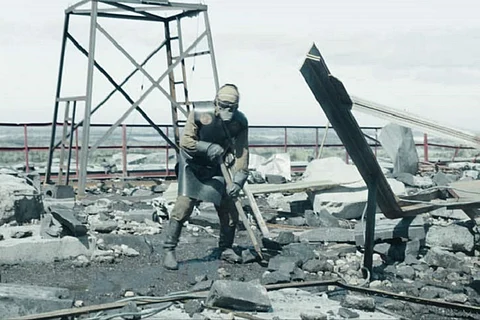

There is a theory that the Chernobyl disaster in 1986 accelerated the collapse of the erstwhile USSR in the late ‘80s, and Mikhail Gorbachev, the last leader of the Soviet Union, himself ratified this theory in one of his interviews in the mid-2000s.
Over the past three decades, Chernobyl has remained a political and socio-economic zeitgeist, and the fact that every intricate detail about the nuclear disaster and its aftermath still piques our interest says a lot about its socio-cultural impact. In Craig Mazin’s deftly crafted mini-series for HBO, we are taken back in time when Chernobyl turned into humanity's worst nightmare overnight and the subsequent efforts to save millions of lives from the adverse effects of radiation.
The five episode series, directed by Johan Renck, is a dramatised version of the actual events, and purely from a storytelling point of view, it’s nothing short of a cinematic achievement. Quite rarely has a series been this terrifying and inspiring in equal measure, and when you realise how high the stakes were for scores of scientists, thousands of men who voluntarily sacrificed their lives for the greater good, the idea of the USSR itself, and how far people were willing to go for their duty to the nation, Chernobyl hits you like a thunderbolt.
In the opening episode, titled 1:23:45, Craig Mazin and Johan Renck take us inside the control room of The Chernobyl Nuclear Power Plant, near the city of Pripyat, when a team of engineers realise that a safety test has gone horribly wrong. Soon, there’s a big explosion; however, no one realises the extent of the damage. Anatoly Dyatlov, the assistant chief engineer of the power plant, insists that it’s a minor accident and so, he meets his superiors - Plant manager Viktor Bryukhanov and chief engineer Nikolai Fomin - to tell them that everything is under control.
A few engineers and scientists at the power plant realise the extent of the damage done to the nuclear reactor, but it isn’t until much later that everyone at Chernobyl (and Moscow) realise what has happened. Mikhail Gorbachev appoints renowned scientist Valery Legasov and deputy chairman Boris Shcherbina to head a committee to supervise the clean up operation.
What makes Chernobyl a gripping drama is a reflection of the geography and the context it is set in. Chernobyl, which is surrounded by thick forests, is a gloomy place and the background score, by Icelandic composer Hildur Guðnadóttir, recreates the dread of being inside or in the vicinity of a power plant (he reportedly sounds recorded inside a decommissioned power plant). Even more frightening is its setting in an era when the USSR and the USA were in the midst of a cold war, and a nuclear disaster of such epic proportions would be detrimental to the state. So, initially, they try to downplay the incident and lie blatantly about the extent of the damage done due to the radiation.
Critical decisions, such as evacuating people from the neighbouring regions of the power plant, are delayed and the bureaucracy makes things even more difficult for everyone. Everything adds up, and by the time the series comes to an end, you realise that it is truly a masterclass in building tension and makes you invest so much in its world that a part of your soul is torn apart and shredded to pieces.
The story is narrated from Legasov’s perspective and how he, along with Shcherbina and another nuclear scientist Ulana Khomyuk, took control of the situation and forced the government to take astounding measures to clean up the debris and bring sweeping reforms in other nuclear power plants.
We live in an era where Russian characters are usually shown as antagonists, but Chernobyl makes you sympathise with almost every character in his/her world that you are often astonished by the sacrifices they made in the process. For instance, in one of the best written sequences, when Legasov and Shcherbina convince Gorbachev that they need to use biorobots (men) to clean up the debris on the roof of the reactor, Shcherbina tells hundreds of volunteers that every generation needs to make a sacrifice for the sake of the country. After a soul-stirring speech, people volunteer despite knowing that they’ll die due to radiation.
In another scene, a similar demand is made to the miners who need to dig a massive tunnel underneath the core to stop the contamination of ground-water. An even more devastating sequence in the series is that of animal control, and what happens when biorobots are deployed to clean the roof. If these sequences don’t shake your emotional core, then I don’t know what will.
Both Jared Harris, who played Legasov, and Stellan Skarsgård, as Boris Shcherbina, are brilliant in their roles. In the end, the series leaves such a huge impact that the very mention of ‘graphite’ makes you shudder with fear, and you feel a huge sense of respect for hundreds of people who laid down their lives.
Chernobyl radiates with brilliance in every frame, and it serves as a stark warning to humanity that disasters like these could occur again, if you don’t pay attention to the scientific community about the dangers of misusing technology and the lack of proper safety precautions.
In the final episode, Legasov says, “Every lie we tell incurs a debt to the truth. Sooner or later, the debt is paid.” Those words of wisdom will continue to ring in your ears and conscience long after watching the series. HBO’s Chernobyl treads a zone where it’s hard to separate fact from fiction, depending on whose version you want to believe in, but the truth behind it is stranger than fiction.